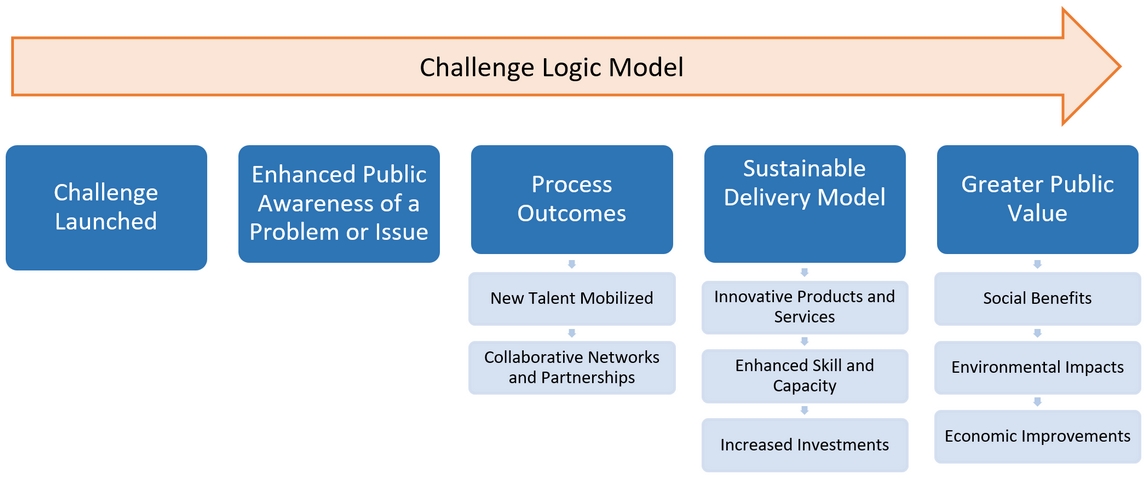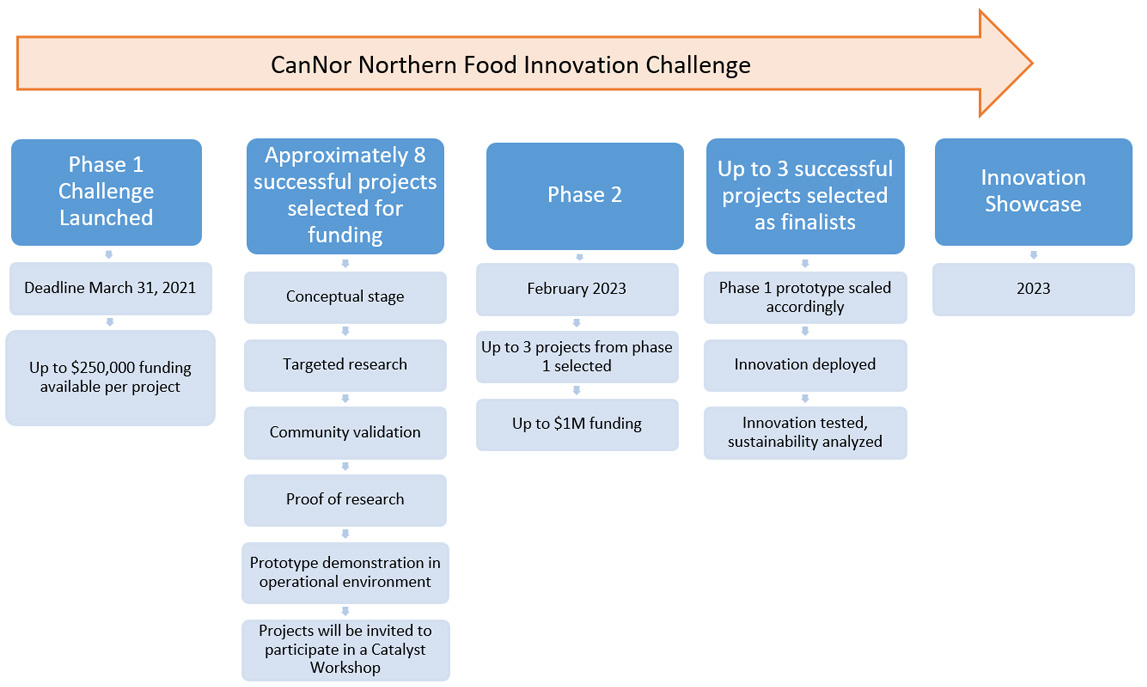Northern Food Innovation Challenge
The Canadian Northern Economic Development Agency invites you to learn about the Northern Food Innovation Challenge Phase 2 participants. The Challenge is now in its final phase and is no longer accepting applications.
Table of contents
The Northern Food Innovation Challenge is one of three streams under the Northern Isolated Community Initiatives (NICI) Fund.
The objective of this Challenge is to support innovative, community-led projects for local and Indigenous food production systems to help improve food security in Canada's territories.
This challenge consists of two phases:
Phase 1: Conceptual stage to testing environment.
- Nine Northern Food Innovation Challenge participants have been selected for funding under Phase 1 (up to $250,000 per project). You can follow the link Northern Food Innovation Challenge Phase 1 Participants to find a list of the participants and their projects.
Phase 2: Project scaling and deployment with direct benefits at a local level.
- The successful Phase 2 candidates can be found here.
Food Security in Canada's territories

Text alternative for Figure 1. Percentage of food insecure households in Canada, provinces and territories, 2017-2018 (modified from Statistics Canada)
| Province or Territory | Percentage of Food Insecure Households |
|---|---|
| Nunavut | 57 |
| Northwest Territories | 21.7 |
| Yukon | 16.9 |
| British Columbia | 12.4 |
| Alberta | 12.9 |
| Saskatchewan | 13.9 |
| Manitoba | 14.4 |
| Ontario | 13.3 |
| Quebec | 11.1 |
| New Brunswick | 13 |
| Nova Scotia | 15.4 |
| Prince Edward Island | 13.9 |
| Newfoundland and Labrador | 14.8 |
- According to Statistics Canada's 2017-2018 Canadian Community Health Survey, the territories face a higher rate of food insecurity than the rest of Canada. The survey showed that household food insecurity was 57% in Nunavut, 21.6% in the Northwest Territories, and 16.9% in Yukon.
- Women, children, and Indigenous peoples are particularly vulnerable to food insecurity with substantial impacts on health and well-being. Indigenous peoples are at a higher risk of food insecurity due to many reasons – including forced relocation and residential schools – that disrupted their connection to traditional food systems. This disruption has negatively affected intergenerational knowledge transfer of harvesting and hunting skills, and of healthy eating habits.
- There are interconnected factors that contribute to the high cost of food and food insecurity in the territories. The remoteness and isolation of communities contribute to a high cost of living, socio-economic status (e.g. poverty, high unemployment), and the high costs of transportation and labour all impact the cost and accessibility of food. Territorial food systems face unique challenges and opportunities. In the territories, food systems are comprised of three interrelated areas: the market system (i.e. market or imported foods), the country food system (i.e. harvesting and sharing traditional/ wild foods), and an emerging system of locally grown foods (i.e. community greenhouses, small scale farms, and farmers markets). The prevalence of these interrelated areas and the cultural importance of country foods to Indigenous communities requires innovative solutions to address food security issues in the territories.
- For more information on food security in Canada's territories, please view:
About the Challenge
- This challenge was pan-Canadian and open to not-for-profits, Indigenous governments and economic development corporations, municipal governments, academic institutions and small- and medium-sized enterprises. The challenge empowered territorial communities to adopt strategies to improve the lives of their residents through increasing food security.

Text alternative for Northern Food Innovation Challenge Logic Model
- Challenge Launched
- Enhanced Public Awareness of a Problem or Issue
- Process Outcomes
- New Talent Mobilized
- Collaborative Networks and Partnerships
- Sustainable Delivery Model
- Innovative Products and Services
- Enhanced Skill and Capacity
- Increased Investments
- Greater Public Value
- Social Benefits
- Environmental Impacts
- Economic Improvements
Key Challenge Areas
Priority was given to projects that used innovative solutions that work in a northern or remote climate, can be deployed in the territories, and address one or more of the following areas:
- Food Production/Harvesting
- Food Processing
- Food Distribution/Transportation
Projects related to innovative training and capacity building in these areas were also considered.
Priority was given to proposed projects that address food security in Indigenous communities or other vulnerable populations.
Eligibility
The Challenge was for:
- not-for-profit associations;
- Indigenous governments, community-owned economic development corporations or other organizations;
- municipal governments;
- academic institutions; and
- small-and-medium-sized enterprises.
Applicants located outside of the territories were encouraged to apply provided that they had a territorial partner and could demonstrate how the proposed innovation could provide direct benefits to reducing issues related to food insecurity or strengthening food systems in one or more of the territories.
Highlights
- Funding for project costs up to $250,000 for successful applicants in Phase 1.
- Final Innovators were eligible for up to $1 million to deploy their project in Phase 2.
- Access to northern experts and CanNor support to shepherd project development through pathfinding and mentorship.
Process

Text alternative for CanNor Northern Food Innovation Challenge
- Phase 1 Challenge Launched
- Deadline March 31, 2021
- Up to $250,000 funding available per project
- Approximately 8 successful projects selected for funding
- Conceptual stage
- Targeted research
- Community Validation
- Proof of research
- Prototype demonstration in operational environment
- Projects will be invited to participate in a Catalyst Workshop
- Phase 2
- February 2023
- Up to 3 projects from phase 1 selected
- Up to $1M funding
- Up to 3 successful projects selected as finalists
- Phase 1 prototype scaled accordingly
- Innovation deployed
- Innovation tested, sustainability analyzed
- Innovation Showcase
- 2023
Virtual Catalyst Workshops
As part of the Northern Food Innovation Challenge, CanNor hosted a series of Virtual Catalyst Workshops to share information and expertise. Along with the nine innovators, members of the Advisory Committee and CanNor staff took part in the workshops which ran from April 11-13, 2022.
Timeline/Key Dates
- Challenge Launch: January 26, 2021
- Challenge Deadline: March 31, 2021
- Phase 1 participants announced (nine participants were chosen from all applicants): January 2022
- Workshops: 2022
- Phase 2 participants announced: Fall 2023
- Innovation Showcase: Winter 2024
For more information
If you have any questions about this challenge, please email Operations@cannor.gc.ca, or reach out to one of our regional offices.